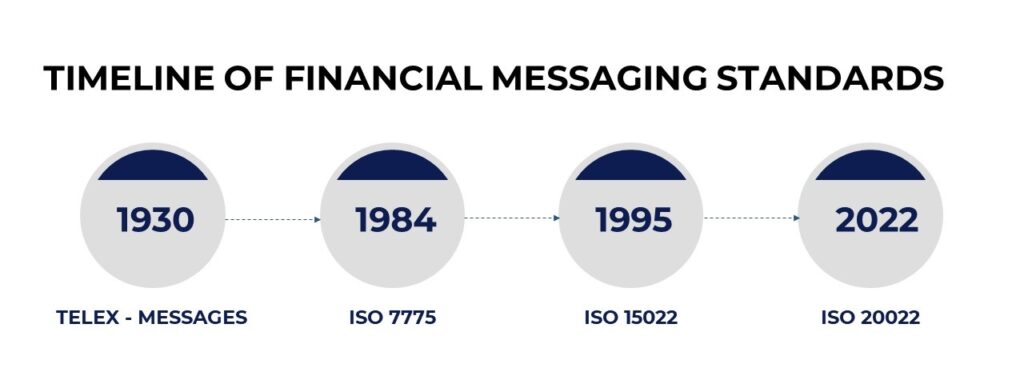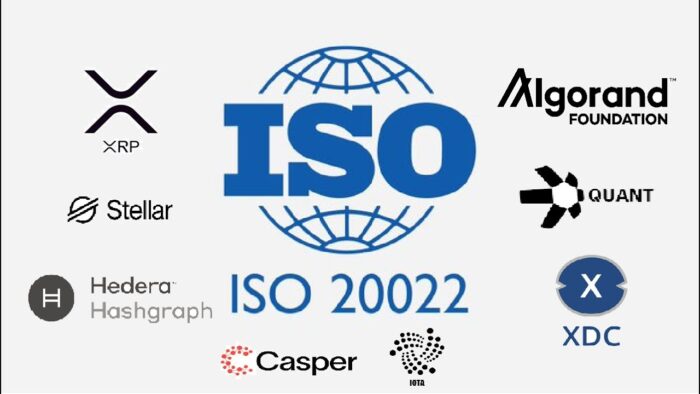Financial institutions are making significant strides in their efforts to adopt ISO 20022 compliant crypto experiments. This groundbreaking initiative marks a pivotal moment in the evolution of the global financial landscape. By embracing ISO 20022, these institutions are revolutionizing the way they process cross-border payments, enhancing security, efficiency, and interoperability. With a keen eye on innovation, several prominent banks and financial organizations are actively collaborating to develop and test new crypto-based solutions. This is in line with their commitment to providing cutting-edge technologies to their customers while ensuring regulatory compliance.
By leveraging ISO 20022, financial institutions can streamline their payment processes, reduce costs, minimize errors, and enable real-time transactions. This new standard enables enhanced data richness, paving the way for improved analytics and insights. Through strategic partnerships and experiments, these institutions aim to shape the future of finance and drive the widespread adoption of crypto-enabled transactions. As the world becomes increasingly interconnected, the collaboration between financial institutions and ISO 20022 promises to unlock unprecedented potential in the realm of digital payments.
Table of Contents

Role of financial institutions in ISO 20022 compliant crypto experiments
Financial institutions play a crucial role in the development and implementation of ISO 20022 compliant crypto experiments. As the gatekeepers of the global financial system, these institutions are responsible for ensuring the security, efficiency, and reliability of cross-border transactions. By actively participating in crypto experiments, they are at the forefront of driving innovation and shaping the future of finance.
One of the key roles of financial institutions in ISO 20022 compliant crypto experiments is to provide the necessary infrastructure and expertise. They have the resources and technical capabilities to develop and test new solutions that align with the ISO 20022 standard. By collaborating with other institutions and fintech companies, they can leverage collective knowledge and experience to create robust and scalable systems.
Financial institutions also act as intermediaries between traditional financial systems and the emerging crypto ecosystem. They bridge the gap between fiat currencies and digital assets, enabling seamless conversion and transfer of value. Through their involvement in ISO 20022 compliant crypto experiments, they are pioneering the integration of cryptocurrencies into the mainstream financial infrastructure.
Benefits of ISO 20022 compliance for financial institutions
The adoption of ISO 20022 compliant crypto experiments brings a multitude of benefits for Banking institutions. By embracing this new standard, these institutions can enhance their payment processes, improve efficiency, and unlock new possibilities for their customers.
One of the key benefits of ISO 20022 compliance is the ability to streamline payment processes. The standard provides a common language for data exchange, enabling seamless interoperability between different systems and institutions. This reduces the complexity and costs associated with cross-border transactions, ultimately leading to faster settlement times and improved customer satisfaction.
ISO 20022 also enables enhanced data richness, allowing Banking institutions to gather comprehensive information about transactions. This data can be leveraged for advanced analytics and insights, enabling better risk management, fraud detection, and customer profiling. By harnessing the power of data, financial institutions can make more informed decisions and provide personalized services to their customers.
Furthermore, ISO 20022 compliance enhances security and reduces the risk of errors. The standard includes robust data validation mechanisms and standardized message formats, ensuring the accuracy and integrity of transaction data. This reduces the likelihood of fraud and minimizes the potential for human errors, ultimately safeguarding the financial system and protecting the interests of both institutions and customers.
Overview of major financial institutions involved in ISO 20022 compliant crypto experiments
Several major financial institutions have taken a proactive approach to adopting ISO 20022 compliant crypto experiments. These institutions, known for their commitment to innovation and customer-centric solutions, are leading the way in shaping the future of finance.
JP Morgan Chase & Co.: JP Morgan has been actively involved in ISO 20022 compliant crypto experiments, leveraging its expertise in blockchain technology and digital assets. The institution has collaborated with other financial institutions to develop and test new solutions that enhance cross-border payments and enable real-time transactions. Their experiments have showcased the potential of ISO 20022 in revolutionizing the global financial landscape.
Bank of America: Bank of America has been at the forefront of ISO 20022 compliant crypto experiments, exploring the integration of digital assets into their payment processes. Through partnerships with fintech companies and blockchain startups, the institution has developed innovative solutions that leverage the power of ISO 20022 to enhance security, efficiency, and transparency in cross-border transactions.
Citigroup: Citigroup has embraced ISO 20022 compliance in its crypto experiments, focusing on improving the speed and efficiency of global payments. By leveraging the standard, the institution aims to provide its customers with faster settlement times, reduced costs, and enhanced transparency. Their experiments have shown promising results, highlighting the transformative potential of ISO 20022 in the financial industry.
HSBC: HSBC is actively involved in ISO 20022 compliant crypto experiments, aiming to enhance its cross-border payment capabilities. The institution has partnered with fintech startups and blockchain companies to develop innovative solutions that leverage the power of ISO 20022 to enable real-time transactions and reduce friction in cross-border payments. Their experiments have showcased the potential of ISO 20022 in driving efficiency and interoperability.

Case studies: Successful ISO 20022 compliant crypto experiments by financial institutions
Several financial institutions have successfully implemented ISO 20022 compliant crypto experiments, showcasing the transformative potential of this new standard. These case studies highlight the benefits and challenges faced by financial institutions in their journey towards ISO 20022 compliance.
JP Morgan Chase & Co.: JP Morgan conducted a successful ISO 20022 compliant crypto experiment in collaboration with a leading fintech company. The experiment aimed to streamline cross-border payments by leveraging the power of blockchain technology and the ISO 20022 standard. The results were impressive, with faster settlement times, reduced costs, and enhanced transparency.
Bank of America: Bank of America implemented an ISO 20022 compliant crypto experiment to enhance the efficiency and security of cross-border transactions. By leveraging the standard, the institution was able to reduce settlement times, minimize errors, and improve customer satisfaction. The experiment showcased the potential of ISO 20022 in revolutionizing the global financial landscape.
Citigroup: Citigroup conducted a successful ISO 20022 compliant crypto experiment to enhance its global payment capabilities. By adopting the standard, the institution was able to streamline its payment processes, reduce costs, and enable real-time transactions. The experiment demonstrated the transformative potential of ISO 20022 in driving efficiency and interoperability.
HSBC: HSBC implemented an ISO 20022 compliant crypto experiment to improve its cross-border payment capabilities. By leveraging the standard, the institution was able to enhance security, reduce settlement times, and enable real-time transactions. The experiment showcased the potential of ISO 20022 in driving efficiency and transparency in the financial industry.
Challenges faced by financial institutions in implementing ISO 20022 compliance in crypto experiments
While the adoption of ISO 20022 compliant crypto experiments brings numerous benefits, Banking institutions also face several challenges in their journey towards compliance.
One of the key challenges is the complexity of integrating crypto-based solutions into the existing financial infrastructure. Financial institutions must ensure seamless interoperability between traditional systems and emerging technologies, which requires significant investment in technology and expertise. Additionally, regulatory compliance and risk management are critical considerations, as financial institutions must navigate the evolving regulatory landscape surrounding cryptocurrencies.
Another challenge is the scalability of crypto-based solutions. As the adoption of cryptocurrencies grows, financial institutions must ensure that their systems can handle the increasing transaction volumes without compromising security or performance. This requires robust infrastructure and continuous innovation to keep pace with the ever-changing crypto ecosystem.
Financial institutions face the challenge of establishing trust and educating customers about the benefits and risks of crypto-enabled transactions. The perception of cryptocurrencies and their associated risks can vary among different demographics, and financial institutions must effectively communicate the advantages and safeguards of ISO 20022 compliant crypto experiments to gain wider acceptance.
Best practices for financial institutions in ISO 20022 compliant crypto experiments
To successfully implement ISO 20022 compliant crypto experiments, financial institutions should consider the following best practices:
Strategic partnerships: Collaborate with fintech companies, blockchain startups, and other financial institutions to leverage collective knowledge and experience. Strategic partnerships foster innovation and enable the development of robust and scalable solutions that align with ISO 20022.
Regulatory compliance: Stay abreast of regulatory developments and ensure compliance with relevant laws and regulations. Engage with regulatory bodies and industry associations to shape the regulatory landscape and establish best practices for crypto-enabled transactions.
Invest in technology and expertise: Allocate resources for technology infrastructure and talent acquisition to support the implementation of ISO 20022 compliant crypto experiments. Financial institutions must have the necessary technical capabilities to integrate crypto-based solutions into their existing systems and ensure seamless interoperability.
Education and customer engagement: educate customers about the benefits and risks of crypto-enabled transactions and provide transparent and user-friendly interfaces for their participation. Building trust and confidence is crucial to driving wider adoption of ISO 20022 compliant crypto experiments.
Future prospects of ISO 20022 compliant crypto experiments for financial institutions
The future prospects of ISO 20022 compliant crypto experiments for financial institutions are promising. As the world becomes increasingly interconnected, the collaboration between financial institutions and ISO 20022 has the potential to unlock unprecedented potential in the realm of digital payments.
ISO 20022 compliant crypto experiments enable financial institutions to drive innovation, enhance security, and improve efficiency in cross-border transactions. By leveraging blockchain technology and the ISO 20022 standard, these institutions can create new solutions that offer faster settlement times, reduced costs, and increased transparency. As adoption grows, the benefits of ISO 20022 compliant crypto experiments will become more evident, paving the way for a more inclusive and efficient global financial system.
Regulatory considerations for financial institutions in ISO 20022 compliant crypto experiments
Financial institutions must navigate the regulatory landscape surrounding ISO 20022 compliant crypto experiments. As cryptocurrencies gain traction, regulators are increasingly focused on ensuring consumer protection, preventing money laundering, and mitigating systemic risks.
Financial institutions should closely monitor regulatory developments and engage with regulatory bodies to shape the regulatory framework. They must adhere to anti-money laundering (AML) and know-your-customer (KYC) requirements, implement robust security measures, and ensure compliance with relevant data protection regulations.
Financial institutions should actively participate in industry associations and standard-setting bodies to contribute to the development of best practices and guidelines for ISO 20022 compliant crypto experiments. By working collaboratively with regulators and industry stakeholders, financial institutions can help create a balanced regulatory environment that fosters innovation while safeguarding the interests of all stakeholders.
The evolving role of financial institutions in the crypto industry with ISO 20022 compliance
The adoption of ISO 20022 compliant crypto experiments marks a significant milestone in the evolution of the global financial landscape. Financial institutions are at the forefront of this revolutionary initiative, actively collaborating to develop and test new crypto-based solutions.
By embracing ISO 20022, financial institutions can streamline their payment processes, reduce costs, minimize errors, and enable real-time transactions. This new standard enables enhanced data richness, paving the way for improved analytics and insights. Through strategic partnerships and experiments, these institutions aim to shape the future of finance and drive the widespread adoption of crypto-enabled transactions.
As the world becomes increasingly interconnected, the collaboration between financial institutions and ISO 20022 promises to unlock unprecedented potential in the realm of digital payments. Financial institutions play a crucial role in the development and implementation of ISO 20022 compliant crypto experiments, providing the necessary infrastructure, expertise, and regulatory compliance.
The future prospects of ISO 20022 compliant crypto experiments for financial institutions are promising, with potential benefits in terms of efficiency, security, and transparency. However, financial institutions must also navigate challenges such as integration complexity, scalability, and customer trust. By adopting best practices and actively engaging with regulators and industry stakeholders, financial institutions can successfully harness the power of ISO 20022 and drive innovation in the crypto industry.

Relevance to Crypto.com
Enhanced Interoperability: ISO 20022 is becoming increasingly relevant in the cryptocurrency industry as it provides a common language for different crypto platforms, banks, and financial institutions to communicate seamlessly. Crypto.com has recognized the importance of this standard in bridging the gap between traditional finance and the crypto space.
Efficient Payment Processing: Crypto.com, being a cryptocurrency platform that offers a wide range of services, including crypto wallets, debit cards, and payment processing, benefits from ISO 20022’s structured data format. This allows for efficient and error-free processing of cryptocurrency transactions, making it easier for users to transfer funds and make payments.
Improved User Experience: By adhering to ISO 20022, Crypto.com can offer its users a more standardized and reliable payment experience. This is especially crucial in the world of cryptocurrencies, where transaction errors or delays can have significant consequences. The standardization provided by ISO 20022 helps minimize these issues.
Integration with Traditional Finance: Central banks and traditional financial institutions have widely adopted ISO 20022. By embracing this standard, Crypto.com is positioning itself to interact seamlessly with the broader financial ecosystem. This integration can lead to greater acceptance and recognition of cryptocurrencies in traditional financial markets.
Global Standardization: ISO 20022 is a global standard supported by many countries and financial organizations worldwide. Its adoption by Crypto.com ensures that its services can be easily used by customers around the world, promoting international expansion and user accessibility.
In summary, ISO 20022 plays a crucial role in enhancing the efficiency, reliability, and global reach of Crypto.com’s cryptocurrency services. By adopting this standard, Crypto.com is not only improving its own operations but also contributing to the broader adoption and acceptance of cryptocurrencies in the global financial landscape.
🚀Ready to embark on your crypto journey?💰🔒Secure, simple and rewarding – Crypto.com is your gateway to the future of finance!🌐💎Click here 👉👇to begin your adventure in the crypto universe today
💼 Show your crypto flair! 💫 Dive in here 👇 for our special merchandise 🎉
🚨DISCLAIMER🚨
Investingcrypto717.com’s 🌐 content is solely educational🎓. NOT financial advice🙅♂️💼. Do your own research🔍💡, consult a professional before investing💼🤝. You invest at your own risk⚠️💸. #NotFinancialAdvice #InvestingCrypto717🔐🌍




